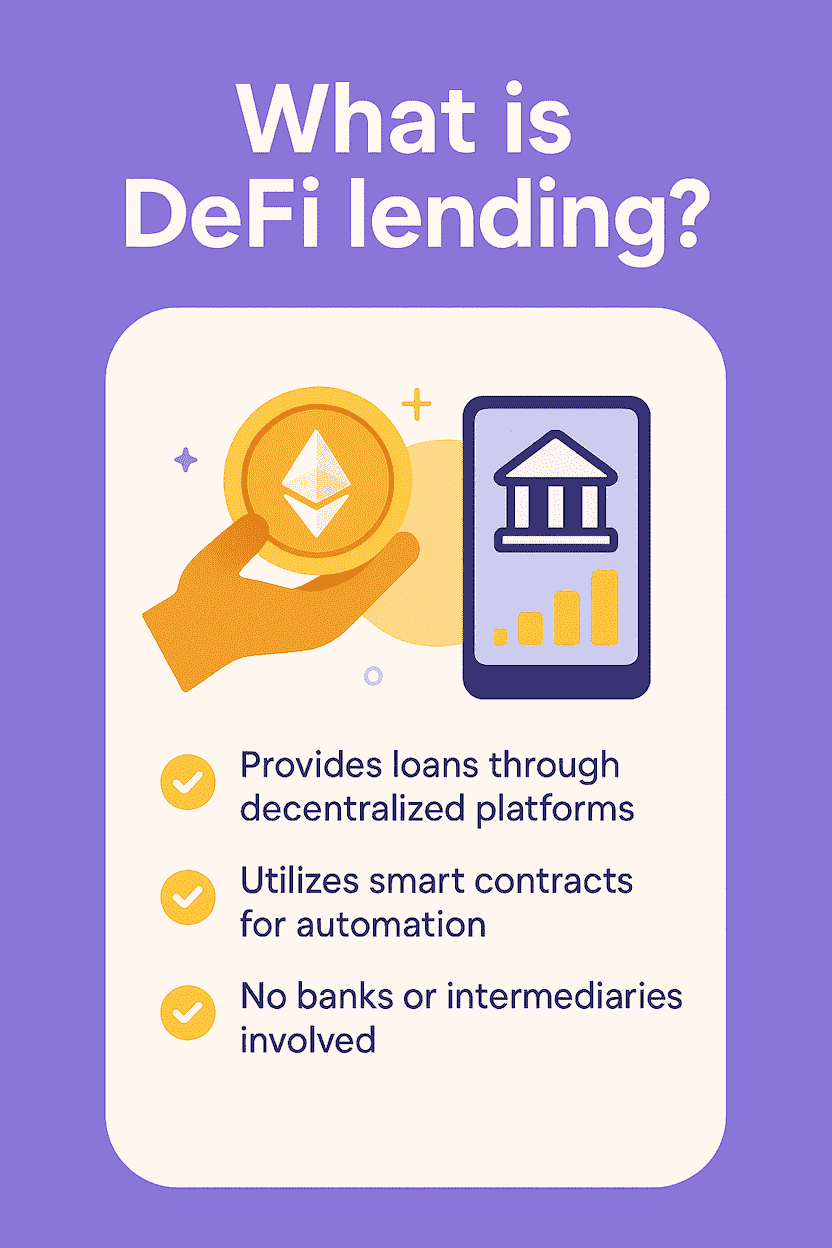Advertiser Disclosure
Last update: September 25, 2025
5 minutes read
DeFi Lending: Why Students Are Risking It All to Skip Banks
Discover how DeFi lending is changing the way college students manage their money. And how it can hurt you. This stuff can make your tuition money disappear faster than free pizza at orientation.

By Derick Rodriguez, Associate Editor
Edited by Yerain Abreu, M.S.
Learn more about our editorial standards



By Derick Rodriguez, Associate Editor
Edited by Yerain Abreu, M.S.
Learn more about our editorial standards
Sick of earning basically nothing on your savings account? Some students are ditching banks entirely for DeFi lending—basically letting computers handle their money instead of humans. Sounds futuristic, but it's riskier than it looks.
Here's what's actually happening: instead of banks taking a cut of everything, you lend directly to other people through blockchain apps. Sometimes it pays more than traditional savings. Sometimes you lose everything.

Key takeaways
- DeFi lending lets you earn interest or borrow using crypto, but your money can vanish fast if prices crash or hacks hit
- Students are drawn to it for higher returns and no credit checks, but fees, volatility, and zero protections make it risky
- Only try it with extra cash you can afford to lose, never with tuition or essentials
What is DeFi lending?
DeFi cuts out the middleman; no more Wells Fargo taking their slice. You put your cryptocurrency into shared pools, other people borrow from those pools, they pay interest, and you get paid.
The whole thing runs on "smart contracts", which are basically robot agreements that work automatically. No loan officers, no approval processes, just code doing its thing 24/7.
Popular platforms include Compound, Aave, and MakerDAO. Each has its quirks, but they all promise the same thing: better returns than your pathetic 0.01% savings account.
The catch: Everything's in cryptocurrency, which means your "stable" investment can swing 30% in a day. Fun times.

Why students are trying this
Simple: regular banks are basically paying you nothing right now. Your savings account earns less than inflation, which means you're technically losing money just by being responsible.
DeFi interest rates can be as high as 80% if there's an imbalance between borrowers and lenders, though that's usually during market chaos. More realistic rates have been anywhere from 3-15% depending on the platform and what you're lending.
Plus, no credit checks. Got terrible credit from that one time you forgot to pay your phone bill? DeFi doesn't care. You just need some crypto to get started.
Everything happens instantly too. No "we'll get back to you in 3-5 business days" nonsense.
Compare private student loans now
TuitionHero simplifies your student loan decision, with multiple top loans side-by-side.
Compare Rates
How this actually works (when it works)
To lend your money:
- Buy some cryptocurrency (Ethereum, stablecoins, whatever)
- Get a crypto wallet like MetaMask
- Connect to a DeFi platform
- Deposit your crypto into their lending pool
- Watch the interest roll in (or watch your money evaporate)
To borrow money:
- Put up collateral, usually way more than what you want to borrow
- Pick what you want to borrow
- Confirm the transaction
- Get your loan instantly
Here's where it gets scary: If your collateral loses value, the system automatically sells it to pay back the loan. No warnings, no grace period. Crypto crashes, your collateral gets liquidated, game over.
I know someone who put up $1,000 in Ethereum to borrow $600, then ETH dropped 40% overnight. The system sold his ETH, paid back the loan, and he was left with basically nothing. Brutal lesson in volatility.

TuitionHero Tip
Even “stablecoin” investments can lose value or break their peg, triggering cascading losses or liquidations.
The risks nobody talks about enough
- Code bugs can wipe you out completely: Hackers stole $1.48 billion from the crypto industry in 2024, and cryptocurrency hacks and scams hit $2.1 billion total. When smart contracts break, there's no customer service number to call.
- Crypto prices are insane: I've watched stablecoins (supposedly "stable" cryptocurrencies) lose their peg and drop 20% in hours. Your "safe" investment can become worthless while you're in class.
- Transaction fees will eat you alive: On busy days, it can cost $50+ just to move your money around. That 8% interest rate looks pretty dumb when you're paying $100 in fees to deposit $500.
- The government might shut it all down: Regulators are still figuring out how to handle this stuff. One bad headline and platforms start restricting U.S. users.
Risk | How Bad It Gets | What You Can Do |
|---|---|---|
Smart contract hacks | Lose everything | Use established platforms only |
Crypto price crashes | Lose 50%+ overnight | Only risk money you can afford to lose |
High fees | Fees bigger than profits | Wait for low network activity |
Regulatory crackdown | Platforms shut down | Stay updated on policy changes |

TuitionHero Tip
Start small if you're curious about DeFi. The technology is powerful but complex, and there's a learning curve involved.
Should you actually try this?
Honestly? Probably not if you're living on ramen and struggling with tuition.
Maybe consider if:
- You've got extra cash earning nothing in savings
- You understand crypto and aren't scared of volatility
- You're studying finance/tech and want to learn
- You can afford to lose whatever you put in
Definitely don't if:
- You need this money for school expenses
- The word "liquidation" gives you anxiety
- You're hoping to make quick money for tuition
- You don't understand how any of this works
Start small if you're curious. Throw $100 at it, see what happens, learn from the experience. Treat it like an expensive education, not an investment strategy.
Get your basic financial stuff sorted first: emergency fund, decent credit card, scholarship applications. DeFi should be play money, not survival money.

TuitionHero Tip
Prefer protocols that have undergone third-party code audits and have a good track record.
Advantages and disadvantages of DeFi lending
- Way better interest rates than banks
- No credit checks or paperwork
- Works 24/7, globally
- You actually own your money (until you don't)
- Can lose everything to hacks or bugs
- Crypto prices are completely insane
- Transaction fees eat small deposits
- Zero consumer protection
- Regulatory uncertainty
- Learning curve is steep

Why trust TuitionHero
At TuitionHero, we help you find the best private student loans by comparing top lenders and breaking down eligibility, interest rates, and repayment options. Whether you need additional funding beyond federal aid or a loan without a cosigner, we simplify the process. We also provide expert insights on refinancing, FAFSA assistance, scholarships, and student credit cards to support your financial success.
Frequently asked questions (FAQ)
Yes. IRS treats crypto gains as income. Keep detailed records of everything, or you'll hate yourself at tax time.
You're screwed. There's no FDIC insurance in crypto land. Billions get stolen every year, and users just lose their money.
Technically, yes, but that's like using a slot machine as your college fund. Federal student loans are way more stable and predictable.
There’s no official minimum, but fees make it pointless unless you're putting in at least $1,000+. Smaller amounts just get eaten by transaction costs.
For now, yes, but regulations change fast. Some platforms already block U.S. users because of regulatory pressure.
Final thoughts
DeFi lending is like cryptocurrency itself: full of potential, accompanied by significant hype, and it also carries considerable risk of loss.
The tech is genuinely interesting and might be the future of finance. However, it’s currently just speculation wrapped in financial jargon.
Focus on boring stuff first: scholarships, student loans, part-time jobs, building credit. If you have leftover money burning a hole in your pocket, then maybe throw some at DeFi to see what happens.
Just don't bet your education on computer programs that nobody fully understands yet. The traditional banking system might suck, but at least it won't liquidate your lunch money because Bitcoin had a bad day.
TuitionHero helps you build smart money habits for college and beyond. We can't predict DeFi's future, but we can help you create a solid financial foundation.
Source
Author

Derick Rodriguez
Derick Rodriguez is a seasoned editor and digital marketing strategist specializing in demystifying college finance. With over half a decade of experience in the digital realm, Derick has honed a unique skill set that bridges the gap between complex financial concepts and accessible, user-friendly communication. His approach is deeply rooted in leveraging personal experiences and insights to illuminate the nuances of college finance, making it more approachable for students and families.
Editor

Yerain Abreu
Yerain Abreu is a Content Strategist with over 7 years of experience. He earned a Master's degree in digital marketing from Zicklin School of Business. He focuses on college finance, a niche carved out of his journey through the complexities of academic finance. These firsthand experiences provide him with a unique perspective, enabling him to create content that's informative and relatable to students and their families grappling with the intricacies of college financing.
At TuitionHero, we're not just passionate about our work - we take immense pride in it. Our dedicated team of writers diligently follows strict editorial standards, ensuring that every piece of content we publish is accurate, current, and highly valuable. We don't just strive for quality; we aim for excellence.
Related posts
While you're at it, here are some other college finance-related blog posts you might be interested in.
Shop and compare student financing options - 100% free!

Always free, always fast
TuitionHero is 100% free to use. Here, you can instantly view and compare multiple top lenders side-by-side.

Won’t affect credit score
Don’t worry – checking your rates with TuitionHero never impacts your credit score!

Safe and secure
We take your information's security seriously. We apply industry best practices to ensure your data is safe.
Finished scrolling? Start saving & find your private student loan rate today
Compare Personalized Rates


